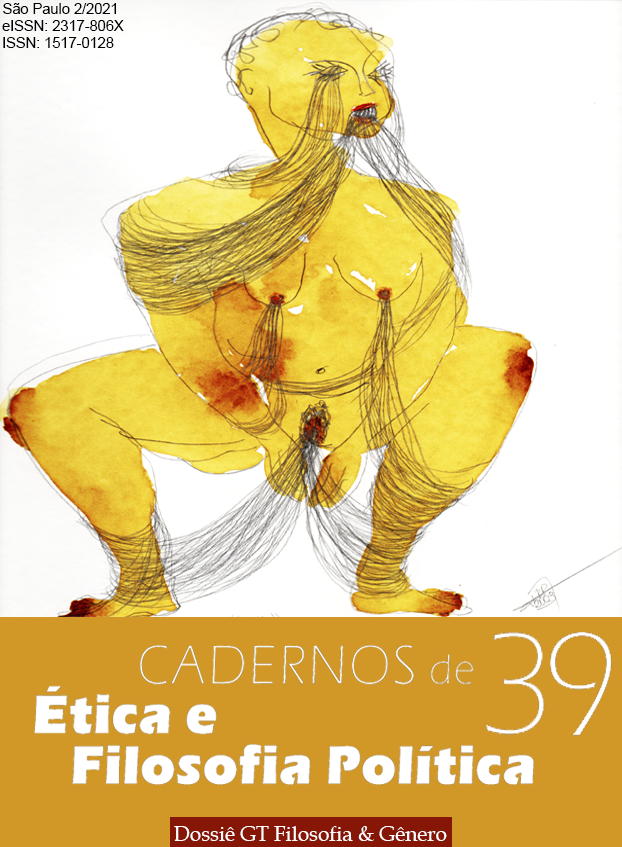Nietzsche and the Controversial Ideal of Female Emancipation
DOI:
https://doi.org/10.11606/issn.1517-0128.v39i2p227-238Keywords:
Emancipation, Woman, Equality, Education, SingularityAbstract
If Nietzsche’s considerations about women are varied, difficult and even problematic, since a single meaning cannot be attributed to the term, the same, in part, does not occur with the term emancipation. Nietzsche presents aphorisms in which he demonstrates some notions attributed to the term. Nevertheless, the philosopher deals with female emancipation not from an exclusively political point of view, but from women as an idea 'in itself'. In this article, I will start with some aphorisms of the work Beyond good and evil, 1886, in which it is possible to verify the meaning he gives to the term, as well as to examine the evidence in the way he reads the equality belief sought by women, in order to demonstrate the inconsistency of the emancipation proposal, since, from the breaking of the distinction and the abandonment of the difference between man and woman, it was necessary to sacrifice the internalization of male values in a consequent emptying, dullness and regression of what it is unique in women. To develop the proposed objective, I will relate the theme to other aphorisms, in order to emphasize that the issue of female emancipation as a sine qua non condition of belonging to the public space, locus in which political actions are effective and considered, had also been problematized by Wollstonecraft , in what Carole Pateman called the “Wollstonecraft dilemma”, namely, to demand equality is to accept the patriarchal conception of citizenship, in which women must resemble men in order to be seen on the public scene, within the scope of political action. Thus, I will seek to examine Nietzsche's analysis with regard to female emancipation and its conceptual developments, without, however, failing to make other weavings with authors who thought this conception.
Downloads
References
FREZZATTI. Jr. “A superação da dualidade cultura/biologia na filosofia de Nietzsche”. In: Tempo da ciência, v. 11, n. 22, pp. 115 –135, 2004.
GIACÓIA, O. “Nietzsche e o feminismo”. In: Natureza Humana, v. 4, n. 1, pp. 9 – 31, 2002.
LOPES, Rogério. “Entre ensaio e aforismo: notas sobre o modo de apresentação dos argumentos na filosofia de Nietzsche”. In: FEITOSA, C.; BARRENECHEA, M.A. de; PINHEIRO, P. (Orgs.). A fidelidade à terra: arte, natureza e política. Assim falou Nietzsche IV. Rio de Janeiro: DP&A, 2003. pp. 277-286.
MARESCA, J. “A emancipação da mulher”. Tradução Vânia Dutra de Azevedo. Cadernos Nietzsche, 11, 2001. pp. 107-112.
MARTON, S. “Nietzsche e a crítica da democracia”. Dissertatio, v. 33, pp. 17-33, 2011.
MOUFFE, Chantal. El Retorno de lo Político: Comunidade, ciudadania, pluralismo, democracia radical. Barcelona: Paidós, 1999.
NIETZSCHE, F. Para além de bem e mal. Trad. Paulo César de Souza. São Paulo: Companhia das Letras, 1992.
NIETZSCHE, F. Ecce Homo. Como alguém se torna o que é. Trad. Paulo César de Souza. São Paulo: Companhia das Letras, 2008.
NIETZSCHE, F. Humano, Demasiado Humano. Um livro para espíritos livres. Trad. de Paulo César de Souza. São Paulo: Companhia das Letras, 2000.
NIETZSCHE, F. A Gaia Ciência. Trad. Paulo César de Souza. São Paulo: Companhia das Letras, 2001.
NIETZSCHE, F. Humano demasiado humano II. Trad. Paulo César de Souza. São Paulo: Companhia das Letras, 2008.
NIETZSCHE, F. Genealogia da moral. Trad. Paulo César de Souza. São Paulo: Companhia das Letras, 2009.
PATEMAN, Carole. El desorden de las mujeres: democracia, feminismo y teoria política. Trad. Luisa Fernanda Lassaque. Buenos Aires: Prometeo Libros, 2018.
WOLLSTONECRAFT, Mary. Reivindicação dos Direitos das Mulheres. São Paulo: Boitempo, 2016.
Downloads
Published
Issue
Section
License
Copyright (c) 2021 Patrícia Sheyla Bagot de Almeida

This work is licensed under a Creative Commons Attribution-ShareAlike 4.0 International License.


